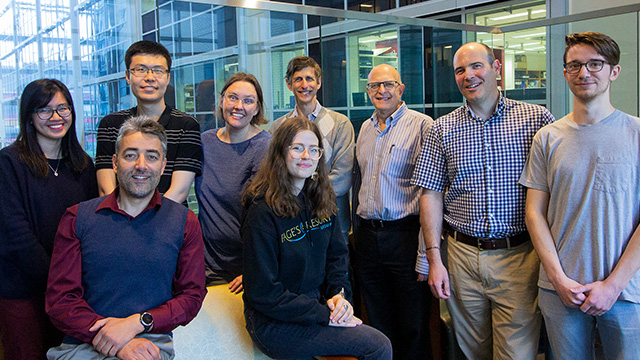
Francois Bolduc (second from the right) and his team are working to create an AI-powered 'chatbot' that will connect families living with neurodevelopmental disabilities to needed online information and resources.
Families living with neurodevelopmental disabilities (NDD) could soon have easier access to help and resources thanks to a University of Alberta research team.
The team is building a 'chatbot'-a computer program that can simulate a human conversation through either text or auditory conversation-to connect individuals with valuable online information and resources that can often be difficult to find.
"There is a real need for families that are struggling with kids with disability and have few resources they can access until they see a specialist, which can take anywhere from six months to a year after the initial referral," said François Bolduc, a pediatric neurologist at the U of A who is leading this interdisciplinary project.
Neurodevelopmental disabilities affect about 13 per cent of Canadians. Most with NDD will live with their conditions-such as impaired motor function, learning, language or non-verbal communication-throughout their lives. According to Bolduc, it's hard to access quality information about NDD online. What is available is often commercially biased or hard to access.
Artificial intelligence tools can now help with that. With AI specialists from the Alberta Machine Intelligence Institute, social scientists and AI education experts from across Canada, they have assembled a unique team able to tackle this complex issue.
The vision of the team is to create a chatbot program that is easily accessible for families with NDD, educators and clinicians, and that directly integrates into a major site such as Facebook or Google search.
The program would direct users to curated resources and fact-based information from credible sources on the internet. The chatbot would go far further than being a simple search engine, said Bolduc.
"It wouldn't just point users to the top-ranking hit on Google. It's being designed as more of an expert system. It would actually mimic the discussion that you would have with health, education or social science experts."
Bolduc's team is supported by a $1.5-million grant over three years from the Canadian Institutes of Health Research (CIHR) and Natural Sciences and Engineering Research Council of Canada (NSERC) for the project. Their work is also supported by a Kid's Brain Health Network team development grant.
The team is working with researchers at the University of Calgary, McGill University and York University to identify resources in their regions of the country that the chatbot could direct users to. They are also data-mining the internet for valid sources of information that are medically and academically relevant. The aim is to automate the program so it could constantly sift through the available information and identify the best websites and resources.
"There's a lot of biased and inaccurate information online that we don't want to be recommending to our users," said Bolduc, who is also a member of the U of A's Women and Children's Health Research Institute. "Plus things change over time. Websites disappear, websites get modified, organizations change their focus or their bias. So we need to be constantly updating that database."
The team hopes that the project will provide resources to families in need at the outset of NDD and before problems snowball into more difficult to reverse symptoms later in life. The chatbot could also allow health providers to progress their efforts more quickly and help a greater number of patients.
"We repeat the same information over and over in the clinic," said Bolduc. "But those simple tasks can now be automated and done online or at home. That way the next appointment with the specialist can be at a more advanced level. A chatbot is perfectly suited for that. It's there 24-7, you can access it when you have time, you can quit it and come back to it."
Bolduc sees the chatbot being especially valuable for rural families who have limited access to specialists living in major centres. The AI program could allow them to keep up to date on new research discoveries and validated therapies in between appointments. Using artificial intelligence would also allow the chatbot to take advantage of comments from users with similar profiles to make personalized recommendations based on what others facing similar situations thought was useful to them.
The team is already working on an early prototype of the chatbot and hope to refine and improve upon it over the next few years before making it available to the public. While the end product is not yet in sight, Bolduc is clear on what it needs to become.
"We need to make it very common so that most people know about it. We want the chatbot to be the starting point for NDD," said Bolduc.
"This is not an Alberta problem, but together we are making an Alberta solution."